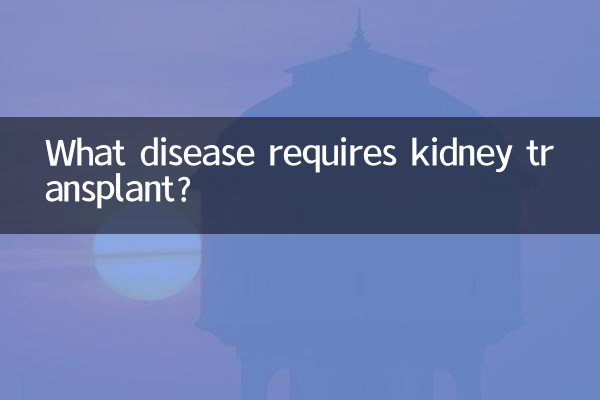What disease requires kidney transplant? ——10 days of hot topics and disease analysis
The kidney is an important excretory and regulatory organ of the human body. When kidney function is severely damaged, a kidney transplant may be required. In recent years, topics related to kidney disease have attracted much attention. This article will combine the popular discussions on the Internet in the past 10 days to analyze which diseases require kidney transplantation and provide structured data for reference.
1. Main diseases requiring kidney transplantation

The following are common clinical diseases requiring kidney transplantation:
| Disease name | Main symptoms | Necessity of kidney transplant |
|---|---|---|
| chronic glomerulonephritis | Proteinuria, hypertension, and gradual decline in renal function | End-stage renal failure requires kidney transplant |
| diabetic nephropathy | Poor blood sugar control, proteinuria, edema | Late complications of diabetes requiring kidney transplantation |
| polycystic kidney disease | Bilateral renal cyst enlargement, low back pain, and high blood pressure | Transplantation required after loss of kidney function |
| Hypertensive nephropathy | Long-term high blood pressure causes kidney damage | End-stage renal failure requires kidney transplant |
| lupus nephritis | Autoimmune attacks on the kidneys, leading to decreased kidney function | Severe cases require kidney transplantation |
2. Popular kidney health topics in the past 10 days
According to the analysis of hotspot data across the Internet, recent discussions on kidney health mainly focus on the following aspects:
| hot topics | Discussion popularity | Main point |
|---|---|---|
| Kidney disease rates rising among young people | high | Staying up late, eating high-salt foods, and abusing drugs are triggers |
| Kidney transplant waiting time is too long | Middle to high | Call for increased organ donation rates |
| Artificial Intelligence Assisted Kidney Disease Diagnosis | middle | AI can improve the detection rate of early kidney disease |
| Progress in R&D of New Immunosuppressants | middle | Reduce rejection after kidney transplantation |
3. How to prevent kidney disease?
Prevention is better than cure, and the following steps can help protect kidney health:
1.Control blood pressure and blood sugar: Hypertension and diabetes are the main causes of kidney failure. Regular monitoring and rational use of medication are crucial.
2.healthy eating: Reduce high-salt and high-protein diets, drink more water, and avoid excessive intake of processed foods.
3.Avoid drug abuse: Certain analgesics and antibiotics may damage the kidneys and should be used under the guidance of a doctor.
4.Regular physical examination: Routine urine and kidney function tests can detect kidney problems early.
4. Current status and challenges of kidney transplantation
Kidney transplantation is currently the most effective method for treating end-stage renal disease, but it still faces many challenges:
| challenge | status quo |
|---|---|
| organ shortage | The number of patients waiting for a kidney far outnumbers the number of donors |
| rejection reaction | Require long-term use of immunosuppressants |
| Surgery is expensive | Some patients have difficulty affording medical expenses |
Conclusion
Kidney health cannot be ignored. Many diseases may require kidney transplantation when they progress to the end stage. Through scientific prevention and early intervention, the risk of kidney disease can be reduced. At the same time, raising public awareness of organ donation will help improve the current situation of kidney transplantation. If you or a family member has kidney problems, please seek medical attention promptly to avoid delays in treatment.

check the details

check the details